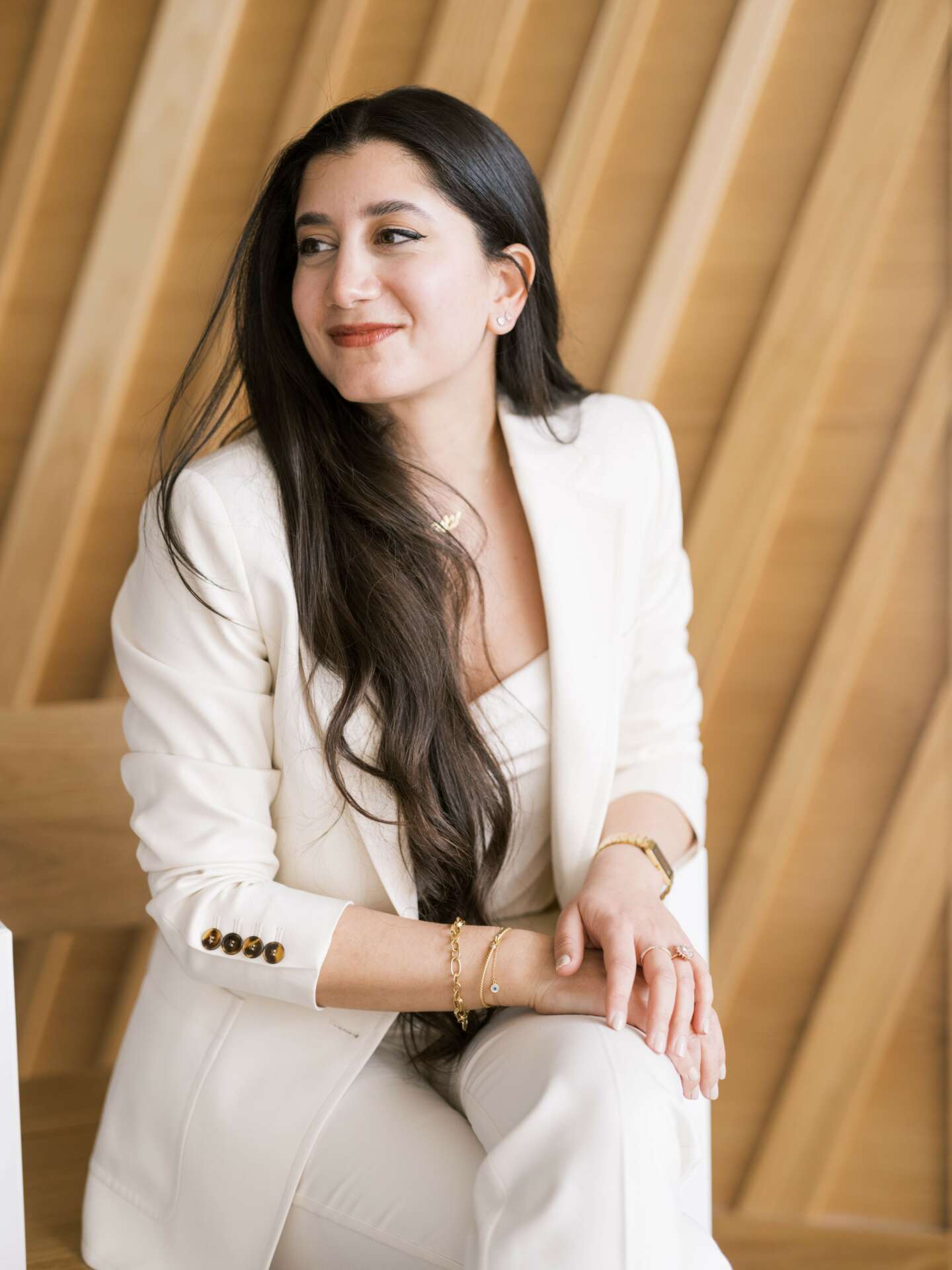We were lucky to catch up with Dr. Rosette Elghossain recently and have shared our conversation below.
Hi Dr. Rosette, thanks for joining us today. We’d love to hear the story behind how you got your first job in field that you currently practice in.
For licensed clinical psychologists, receiving a doctorate is not quite the last step in being able to work independently. After earning our doctorates, we are required to complete a postdoctoral fellowship and receive an additional 2,000 hours of supervised training, after which we can sit for our licensing exams. As such, a significant part of my doctoral training was doing clinical work under the supervision of licensed psychologists. Though I’d provided therapy for a few years prior to getting my first “real” job, it was at practicum sites that were more or less dictated by my program. So, by the time I was applying for postdoctoral fellowships, the world truly felt like my oyster.
Oddly enough, this felt overwhelming to me. Prior to looking for a fellowship, I’d had most of my life (and training/career) mapped out for me. Getting into a university, getting into a graduate program, matching for internship – all of these of course involved an element of choice, but nowhere near as much as applying for a fellowship. While I was living in Baton Rouge, I could go anywhere in the United States, and I had the freedom to say yes or no. Just one year prior, I did not have nearly as much power. When you match for a predoctoral internship, you are contractually obligated to train there. (Luckily, I had matched at an internship I really wanted.)
I went on several postdoc interviews: one in Chicago, one in Wilmington, and others that blended together. Each fellowship came with what felt like heavy drawbacks. The staff described their job site as in an unsafe location, leading them to commute 45 minutes each way. They would also require me to work three evenings a week, as well as half days on Saturdays. At the Wilmington site, the director at the time prevented the current fellows from answering any of my questions and intercepted any calls or emails I sent them. My internship director at the time, a wonderful psychologist, did not mince his words when he told me that was a major red flag.
Though I remember being incredibly attuned to my gut, I also recall being terrified to trust it. For the first time in my life, my choices were purely my own. The thought of turning down offers made me uneasy, to say the least. I wanted to override my instincts and say yes to a bird in the hand. One day, I tearfully confessed everything that was going on to a couple of the other interns. They encouraged me to stay the course, remain patient, and trust it would work out as long as I continued to honor what was important to me.
At that time, I just wanted to work somewhere I felt comfortable. I enjoyed being part of a multidisciplinary team, so I was keeping my eyes peeled for a fellowship that would allow for me to consult with psychiatrists, physicians, and other mental health professionals. My supervisor told me one day he had heard about a position opening up at Tulane University in New Orleans. He said it was for a licensed clinical psychologist and not a postdoc – “I would apply anyway,” he said. New Orleans sounded great – I had visited a couple of times, since Baton Rouge is relatively close, and I had heard of Tulane.
I had a phone interview first. Hearing about eight different voices and not receiving any feedback by way of facial expressions felt a bit daunting. Nevertheless, I could tell my answers resonated with the director and staff. I had worked in a similar setting, had great training, and was a strong case conceptualizer. I also loved group therapy and outreach programming, two things they were trying to develop under the new director. They invited me for an in-person interview.
I remember I kept waiting for more questions – I was ready to present another case, answer questions about my therapeutic style, and discuss my then-unlicensed status. Instead, the director and one of the staff psychologists met with me and started discussing logistics immediately. It only hit me on the drive back to Baton Rouge that this was happening. They said they were going to rewrite the position in order for HR to allow an unlicensed provider to work at the counseling center – and that the director would be my clinical supervisor until I was able to sit for my exams and get licensed.
I was at a wedding later that month when I randomly checked my phone and saw a voicemail from the director officially offering me the job. I felt so relieved to have a solid next step. I’d been living in limbo for several months, wondering if I would know what was happening with my life by the time internship ended. That job at Tulane ended up being one of the things I am most proud of in my life.
As soon as I started, I was tasked with a full clinical caseload and spearheading the counseling center’s first ever marketing and outreach program. I got to partner with offices and programs all across campus, scratching my itch for community involvement and public speaking. It was a great deal of work for the almost five years I worked there, but I felt fulfilled being part of something ever-developing. Once I was licensed, I was offered a staff position. I was able to work alongside incredibly talented mental health providers, many of whom remain good friends of mine. Living in New Orleans was utterly a gift. It was the first time I felt at home after leaving Lebanon, and I met lifelong friends – and my now-husband – living there.

Awesome – so before we get into the rest of our questions, can you briefly introduce yourself to our readers.
I am a licensed clinical psychologist in private practice. Growing up in Lebanon to two Lebanese parents, my career options were: medical doctor. So, naturally, I was a premed student at the American University of Beirut. During my freshman year, I took a psychology intro class and immediately felt a connection with the field. Unlike the premed classes I was enrolled in, psychology felt intuitive and enjoyable. The instructing professor quickly became one of my idols. I remember asking her what she thought I should do, although I knew I wanted to switch majors. It took quite a bit of convincing, but my parents eventually accepted and supported my choice.
In my private practice, I predominantly see adults who have unresolved childhood trauma. I help them better understand how their experiences shaped how they feel about themselves, how they view the world, and the patterns they experience in relationships and beyond. Most of my clients struggle with shame and/or perfectionism, and I support them in building a more self-compassionate relationship while also getting them more acquainted with the agency and power they have in changing their life’s course. Many of my clients are Arab-American and other people of color who are also children of immigrants. I have found that people enjoy having someone who understands the pressures that come with that without having to explain too much. I would also describe myself as a pretty active therapist. My clients often tell me they have realizations and make connections they never have before – they enjoy that I share reflections, feedback, and new perspectives with them. I am also constantly learning and will become Level 1 Internal Family Systems Certified this year.
Something I am proud of is finding a cadence that works for me. My field is full of us bleeding hearts. As such, I spent the first several years in private practice focusing so much on my clients’ needs that I nearly completely disregarded the fact I was running a business. Mental health professionals go through years and years of training to help people because we want to, and we are not taught (and are usually repulsed by) business ownership and marketing skills. I’ve had to overcome limiting beliefs about myself, take risks, and work through my internal monologue – and the collective beliefs about therapists and what they “should” do and be – in order to find what I consider a great balance. For example, I no longer accept insurance. Becoming a private pay therapist took years of working through guilt and fear. But doing so has allowed me to maintain a smaller caseload – which means my clients get 100% of my energy. I am also able to protect their information and allow the two of us to determine how their therapy goes instead of having that dictated by an insurance company. Having a strictly virtual practice allows therapy to be convenient for my clients – who live in multiple states. It has also allowed me to continue client care while also spending more time with my family in Lebanon, something I started doing last year.

Putting training and knowledge aside, what else do you think really matters in terms of succeeding in your field?
Seeking out training and knowledge from fields other than my own! The world is rapidly changing and, as I mentioned earlier, mental health professionals are not taught to run a business. As a licensed clinical psychologist, owning my own business has entailed a great deal of learning on the fly. Everything from billing to marketing, and from networking to social media requires trial-and-error.
Another thing I find critical for success in my field is having good relationships with other providers in the area. We are always referring clients to each other, consulting about tough cases, and attending trainings together. Knowing other mental health professionals keeps the field strong.

What do you think helped you build your reputation within your market?
Very early on, I was always willing to do what others hesitated to do. What I mean by this is that most mental health professionals are most comfortable in the therapy room. We do what we do because we want to sit down with someone, get to know their story, and support them one-on-one. Although I am painfully introverted, I have always been willing to put myself in public speaking situations through outreach, marketing, teaching, and workshops. This has allowed me to work with people across various industries and integrate into my community anywhere I have lived. I also believe in simple, courteous practices: I respond to every inquiry I receive, I show up on time to every therapy session, and I take care of myself so I can give the best service possible.

Contact Info:
- Website: www.drrosette.com
- Instagram: @drrosette
- Linkedin: www.linkedin.com/in/drrosette


